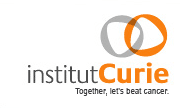
The web supplement to
Nicolas Stransky, Céline Vallot et al.
Nature Genetics, 2006.


|
|

|
| Regional copy number-independent deregulation of transcription in cancer |
| Nicolas Stransky1,13, Céline Vallot1,13, Fabien Reyal1, Isabelle Bernard-Pierrot1, Sixtina Gil Diez de Medina1,2, Rick Segraves3, Yann de Rycke4, Paul Elvin5, Andrew Cassidy5, Carolyn Spraggon5, Alexander Graham5, Jennifer Southgate6, Bernard Asselain4, Yves Allory2,7, Claude C. Abbou2,8, Donna G. Albertson3,9, Jean Paul Thiery1,10,11, Dominique K. Chopin2,8,12, Daniel Pinkel3, François Radvanyi1 |
|
1UMR 144 Centre National de la Recherche Scientifique (CNRS)/Institut Curie, 75248 Paris Cedex 05, France. 2EMI Institut National de la Santé et de la Recherche Médicale 03-37, Hôpital Henri Mondor, 94010 Créteil Cedex, France. 3Comprehensive Cancer Center, University of California San Francisco (UCSF), San Francisco, California 94143, USA. 4Department of Biostatistics, Institut Curie, 75248 Paris Cedex 05, France. 5Cancer and Infection Research Area, AstraZeneca, Mereside, Alderley Park, Macclesfield, Cheshire SK10 4TG, UK. 6Jack Birch Unit of Molecular Carcinogenesis, Department of Biology, University of York, Heslington YO10 5DD, York, UK. 7Department of Pathology, Hôpital Henri Mondor, 94010 Créteil Cedex, France. 8Department of Urology, Hôpital Henri Mondor, 94010 Créteil Cedex, France. 9Cancer Research Institute, UCSF, San Francisco, California 94143, USA. 10Department of Translational Research, Institut Curie, 75248 Paris Cedex 05, France. 11Institute of Molecular and Cell Biology, Proteos, 138673 Singapore. 12Deceased. 13These authors contributed equally to this work. Received 9 August; accepted 13 October; published online 12 November 2006 |
|
Abstract: Genetic and epigenetic alterations have been identified that lead to transcriptional deregulation in cancers. Genetic mechanisms may affect single genes or regions containing several neighboring genes, as has been shown for DNA copy number changes. It was recently reported that epigenetic suppression of gene expression can also extend to a whole region; this is known as long-range epigenetic silencing. Various techniques are available for identifying regional genetic alterations, but no large-scale analysis has yet been carried out to obtain an overview of regional epigenetic alterations. We carried out an exhaustive search for regions susceptible to such mechanisms using a combination of transcriptome correlation map analysis and CGH array data for a series of bladder carcinomas. We validated one candidate region experimentally, demonstrating histone methylation leading to the loss of expression of neighboring genes without DNA methylation. |
| Download data: | ||
| Affymetrix expression dataset as used in Stransky et al. 2006. 8555 U95A/Av2 probe sets - 57 bladder tumor samples. MAS5.0 normalization. | Expression dataset.csv.gz | |
| Affymetrix raw files (.CEL, .CHP and .EXP) and clinical parameters for the expression dataset from Stransky et al. 2006. 57 bladder tumor samples and 5 normal urothelium samples. These data can also be found on ArrayExpress with accession number E-TABM-147 | Affymetrix_data_62_bladder_samples.tar.bz2 | |
| CGH dataset for 57 bladder tumor samples, as used in Stransky et al. 2006. The file contains log2ratio, GNL status (Gain/-1, Normal/0 or Loss/1) and outlier status for all 2385 BAC clones. Genomic positions are given according to the may 2004 freeze of the UCSC Genome Reference Sequence. |
CGH dataset.csv.gz |
|
| Raw CGH dataset (Sproc files) for 57 bladder tumor samples. All sproc.txt files correspond to sproc output for each CGH slide. Clone names and positions on the slide are listed in HA20_spotclone_Jul03_v1_1.txt. Correspondence with sample names can be done with the file filenames_samples.csv. Clinical data is included in the file Clinical_parameters.csv. |
CGH_raw_data.tar.bz2 |
|
Web links: |
|
| Publication | Get the publication from Nature Genetics |
| UMR 144 CNRS/IC, Molecular Oncology group | Visit their web site |
| Last modified November 09 2006 12:54:15 |